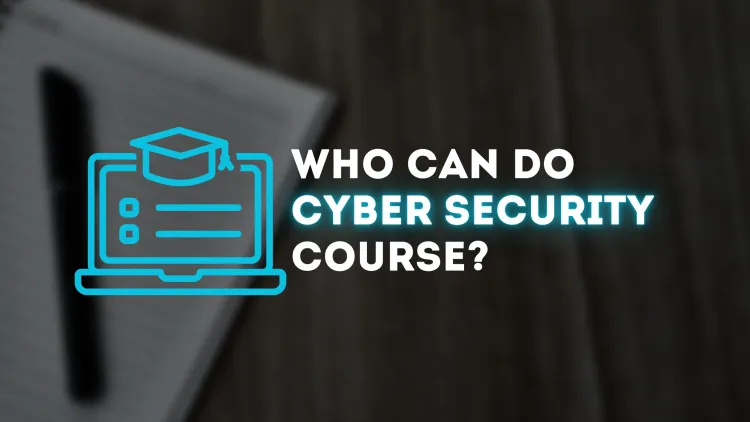Who Can Take a Cybersecurity Course? A Guide for Aspiring Professionals
Cybersecurity courses are suitable for a wide range of individuals, including IT professionals, computer science students, business managers, and anyone interested in technology or shifting careers. Having a basic understanding of computers, a problem-solving mindset, and attention to detail can help you succeed in these courses. Cybersecurity offers job security, career growth, and high-paying opportunities, making it a valuable field for both personal and professional development.

Cybersecurity has become one of the most in-demand fields, with the ever-growing need to protect sensitive information, networks, and systems. As more organizations embrace digital transformation, they face increased threats from cybercriminals, hackers, and malicious actors. As a result, cybersecurity professionals are crucial in safeguarding data and networks, making the demand for skilled individuals in this field higher than ever.
If you’re considering a career in cybersecurity or want to enhance your knowledge in the area, you may wonder who can take a cybersecurity course. Let’s dive into this and explore who can benefit from pursuing a cybersecurity course and what qualifications, background, and skills are necessary.
What is Cybersecurity?
Before diving into who can take a cybersecurity course, let’s briefly understand what cybersecurity is.
Cybersecurity refers to the practice of protecting computers, networks, and data from unauthorized access, attacks, or damage. It involves various techniques and tools designed to prevent cyberattacks, maintain privacy, and ensure the integrity of sensitive information. This includes protecting data in cloud storage, online banking systems, corporate networks, personal devices, and other digital infrastructures.
Who Can Take a Cybersecurity Course?
1. Individuals Interested in Technology and IT
If you have a strong interest in technology, IT, and digital systems, a cybersecurity course is an excellent fit for you. Many cybersecurity courses are designed for individuals who have some foundational knowledge of computer systems and networks. However, even if you’re a beginner, many courses cater to beginners and gradually build up the necessary knowledge and skills.
2. Computer Science and Engineering Students
Computer Science and Engineering students are ideally suited for cybersecurity courses. If you're pursuing a B.Tech, M.Tech, or any related program, you likely have a solid foundation in programming, networking, and systems. Adding cybersecurity to your skillset will make you more valuable in the IT and tech industry. It will open doors for career opportunities in both technical and managerial roles in cybersecurity operations.
3. IT Professionals Looking to Upskill
If you are already working in IT roles such as network administration, systems administration, or software development, a cybersecurity course can be an excellent way to upskill and expand your knowledge. Since cybersecurity is an ever-evolving field, many IT professionals take up cybersecurity courses to stay updated with the latest tools, techniques, and best practices.
4. Aspiring Ethical Hackers and Penetration Testers
If you're passionate about ethical hacking and penetration testing, cybersecurity courses specifically designed for these areas can help you learn how to identify vulnerabilities, conduct ethical hacking, and secure systems. These courses often focus on network security, attack simulations, and defense mechanisms. They are perfect for individuals who enjoy problem-solving and have a keen interest in offensive security techniques.
5. Business and Management Professionals
Even business professionals, especially those in managerial or leadership positions, can benefit from cybersecurity courses. Understanding how to secure a business’s infrastructure, manage risks, and protect sensitive data can help you make informed decisions about company policies and strategies. Many courses offer executive programs that are tailored for business leaders who want to understand the impact of cyber threats on the organization.
6. Data Analysts and IT Security Managers
If you’re working as a data analyst or an IT security manager, understanding cybersecurity is crucial. Protecting sensitive data is a major concern in these roles, and having cybersecurity skills will help you better secure data and networks within your organization. Many security managers take courses to advance their knowledge of risk assessment, threat intelligence, and incident response.
7. Individuals Looking to Switch Careers
If you’re considering a career change and are interested in moving into the cybersecurity field, many courses are designed to help you transition smoothly into the industry. Many individuals from non-technical backgrounds, such as finance, business administration, or even law, have successfully switched careers and found roles in cybersecurity, especially in areas like risk management, compliance, and security auditing.
8. Government and Law Enforcement Officials
Cybersecurity is also crucial for law enforcement and government officials who deal with cybercrime. Understanding the tactics and techniques used by cybercriminals allows these professionals to protect national security, investigate cybercrimes, and enforce laws related to data protection. Law enforcement personnel can benefit from specialized cybersecurity training to combat cyber threats and terrorism effectively.
Prerequisites for a Cybersecurity Course
While many cybersecurity courses are open to people from all walks of life, there are a few basic requirements that might help you excel in the program:
1. Basic Knowledge of Computers and Networks
Although some beginner-friendly courses are available, having a fundamental understanding of how computers work, basic programming knowledge, and familiarity with networks can be beneficial.
2. Problem-Solving Mindset
Cybersecurity involves identifying threats, solving problems, and implementing solutions. Having a curious mindset and a passion for troubleshooting will help you succeed in the field.
3. Attention to Detail
Cybersecurity requires professionals to pay close attention to detail in order to spot threats and vulnerabilities that others might miss. Strong analytical skills are key.
4. Technical Background (Optional)
While not mandatory, having a background in programming (especially languages like Python, Java, or C++) or networking (TCP/IP, DNS, etc.) can be an advantage for more advanced courses in ethical hacking, penetration testing, and network security.
Key Benefits of Taking a Cybersecurity Course
1. Industry-Relevant Skills
You'll learn the latest cybersecurity techniques, tools, and best practices that are directly applicable to real-world scenarios.
2. Job Opportunities
The demand for cybersecurity professionals is at an all-time high. Completing a course can significantly increase your employability, especially in high-demand areas like ethical hacking, incident response, and network security.
3. Job Security
With cyber threats constantly evolving, organizations are investing more in cybersecurity, making it a field with long-term job stability.
4. Hands-On Experience
Many cybersecurity courses provide practical, hands-on labs where you can simulate real cyberattacks and defense strategies, giving you the experience needed for the job.
5. Potential for Higher Salaries
Cybersecurity professionals are among the highest-paid in the tech industry. Gaining relevant certifications can open doors to lucrative job opportunities.
Conclusion
In summary, anyone with an interest in technology and an aptitude for problem-solving can take a cybersecurity course, regardless of their background. Whether you are a student, IT professional, business executive, or career changer, there are courses designed to fit your needs and skill level. The cybersecurity industry offers tremendous growth opportunities and is a great choice for anyone looking to build a rewarding career in one of the most critical fields today.
FAQs:
1. What are the prerequisites for a cybersecurity course?
Basic knowledge of computers and networks is helpful, but there are beginner-friendly courses available for newcomers.
2. Can I take a cybersecurity course without a technical background?
Yes, many courses cater to beginners and help you learn the basics before progressing to more advanced topics.
3. What are the best cybersecurity certifications to pursue?
Some of the best certifications include CompTIA Security+, Certified Ethical Hacker (CEH), and CISSP.
4. Can a business professional benefit from cybersecurity training?
Yes, business managers and leaders can benefit from understanding cybersecurity principles to protect company data and make informed decisions.
5. How long does it take to complete a cybersecurity course?
The duration depends on the course level. Beginner courses may take a few weeks, while advanced certifications can take several months to complete.
6. What skills are needed to be successful in cybersecurity?
Strong analytical skills, attention to detail, problem-solving ability, and basic understanding of computers and networks are key.
7. Can I switch careers to cybersecurity?
Yes, many people have successfully transitioned into cybersecurity from fields such as finance, law, or business administration.
8. Is there a demand for cybersecurity professionals?
Yes, the demand for cybersecurity professionals is growing rapidly due to increasing cyber threats.
9. What job roles can I pursue after completing a cybersecurity course?
You can pursue roles such as cybersecurity analyst, ethical hacker, security consultant, penetration tester, and network security engineer.
10. Is cybersecurity a good career choice?
Yes, cybersecurity is a highly rewarding and in-demand field with job security, high salaries, and opportunities for career growth.











![Top 10 Ethical Hackers in the World [2025]](https://www.webasha.com/blog/uploads/images/202408/image_100x75_66c2f983c207b.webp)



![[2025] Top 100+ VAPT Interview Questions and Answers](https://www.webasha.com/blog/uploads/images/image_100x75_6512b1e4b64f7.jpg)







